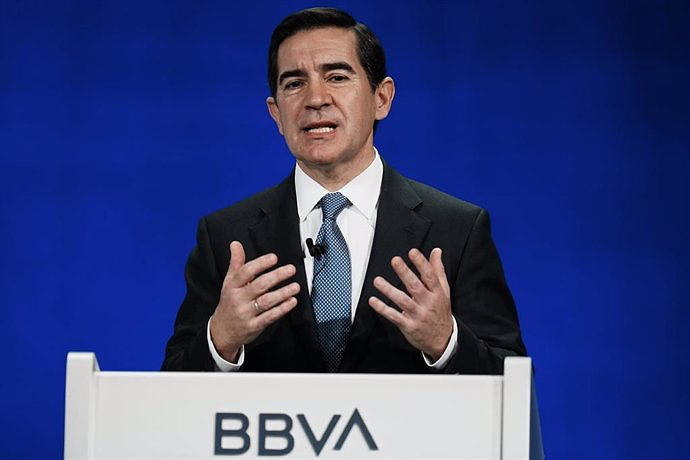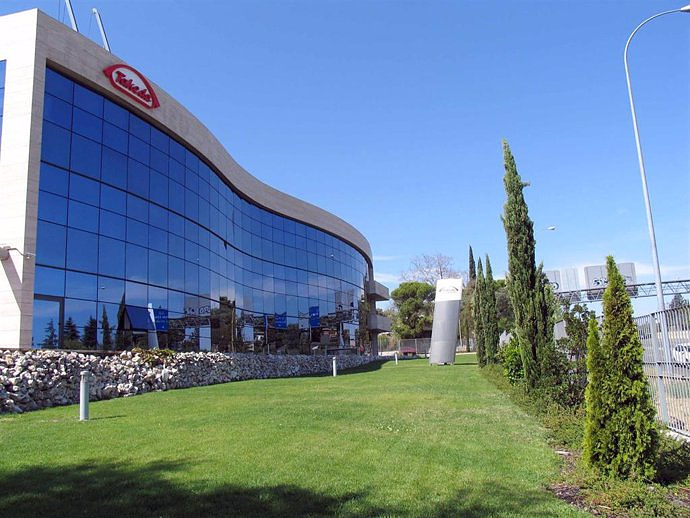On October 3, 2017, the monarch delivered a speech in defense of the constitutional order after the illegal referendum process
MADRID, 23 Dic. (EUROPA PRESS) -
King Felipe VI faces this Saturday what will be his eighth Christmas message at a time when tension and political tension has taken over the debate between the parties after the reform of the Penal Code by which the crime of sedition and that of embezzlement is lowered, as is the failed government attempt to lower the majorities to elect members of the Constitutional Court.
Although the role of the monarch as head of state is above the day-to-day of politics and must maintain an institutional position, Don Felipe usually sends some messages in a political key in the most relevant public interventions, hence there is expectation to know if the monarch makes any generic reflection on these matters.
One of the monarch's most important speeches since his accession to the throne in 2014 was precisely his intervention on October 3, 2017, after the illegal referendum called by the Catalan separatists who these days have seen how the penalties for crimes are repealed or reduced. for which they were condemned.
Then, the monarch accused the pro-independence leaders of violating the Constitution to try to "illegally" proclaim the independence of Catalonia, of trying to "break the unity of Spain" and of being "totally outside the law and democracy".
"Certain authorities of Catalonia", denounced Don Felipe, had violated with their decisions "systematically the norms approved legally and legitimately, demonstrating an inadmissible disloyalty towards the powers of the State" and breaking "the democratic principles of all rule of law". With this, he lamented, "they have undermined harmony and coexistence in Catalan society itself, unfortunately, dividing it." "Today, Catalan society is fractured and at odds," he acknowledged.
"Given this extremely serious situation, which requires the firm commitment of all to the general interests, it is the responsibility of the legitimate powers of the State to ensure the constitutional order and the normal functioning of the institutions", claimed Felipe VI, defending a "self-government of Catalonia, based on the Constitution and its Statute of Autonomy".
"These are difficult times, but we will overcome them," he assured both Spaniards and Catalans, "because we believe in our country and we feel proud of who we are" and "because our democratic principles are strong, they are solid." Don Felipe ended his speech by expressing "the firm commitment of the Crown to the Constitution and to democracy."
It is common for the monarch to mention the Constitution and respect for it in his speeches. This also happened in his speech twelve months ago when he vindicated both the 1978 Magna Carta and the consensus.
The differences of opinion, he maintained, "should not prevent consensuses that guarantee greater stability, greater well-being in homes and give families the necessary peace of mind regarding their future." "The Constitution has been and is the master beam that has favored our progress, the one that has sustained our democratic coexistence in the face of crises" and for all this, he stressed, it deserves "respect, recognition and loyalty."
In Zarzuela, as usual, there is total secrecy regarding the content of the message and the circumstances in which it will be recorded, since as a general rule it is not broadcast live but is recorded a few days in advance. What is certain, because it is tradition, is that the Casa del Rey will send a copy of the text to Moncloa to inform the Government.
On the other hand, the question of the emeritus King has been relegated to the background, now that he no longer has any legal proceedings open in Spain. If a year ago the debate was around the possible return of the former monarch, twelve months later Don Juan Carlos has already clarified that he will maintain his permanent residence in the United Arab Emirates and has already paid a visit to Spain.
His passage through the Galician town of Sanxenxo, to attend a regatta in which the 'Bribón' participated, and then through the Palacio de la Zarzuela has been a turning point. Since it occurred at the end of May, the one who was monarch for almost four decades has kept a low profile and there have been no more rumors about an eventual return.
The emeritus was reunited with his son, the King, for the first time since he went into exile in August 2020. Both were together and, according to Zarzuela, they spoke about "family issues as well as about different events and their consequences in Spanish society " since he moved to the Gulf country, in an apparent allusion to the discontent surrounding the activities of the former monarch that were the subject of a judicial investigation.
In addition, the Casa del Rey reminded Don Juan Carlos that in his March letter to Felipe VI, in which he conveyed his desire to be able to travel to Spain on time, he had informed him of his decision "to organize his personal life and his place of residence in areas of a private nature" when he returned with a view to continuing to enjoy "the greatest possible privacy", in clear contrast to the media visit that had just ended.
Father and son met again last September on the occasion of Elizabeth II's funeral in London. Both, accompanied by Queen Letizia and Doña Sofía, attended the reception offered by King Carlos III at Buckingham Palace --separately-- and, to the general surprise, they were seated together in Westminster Abbey during the funeral.
Unless Don Juan Carlos makes another visit to Spain before, Felipe VI and the emeritus will most likely meet again on May 6 at the coronation of Carlos III in the British capital. The King, as head of the Royal Family, will be invited and it is to be expected that, as was the case with the funeral, the emeritus will also be invited, given the ties of kinship that unite both families.
On the other hand, although COVID-19 is still present, the war in Ukraine and the consequences derived from it have come to the fore. The King has been mentioning the conflict and the impact it is having on the Ukrainians in his speeches whenever the situation has been relevant and it is more than likely that he refers to it on this occasion as well.
Likewise, in all probability Don Felipe will speak of the economic impact that the Russian invasion of Ukraine is having, with the increase in energy prices and skyrocketing inflation, although in the final stretch of the year it has moderated. In fact, already last year he mentioned the "concern in many homes" over this issue.

 Exploring Cardano: Inner Workings and Advantages of this Cryptocurrency
Exploring Cardano: Inner Workings and Advantages of this Cryptocurrency Seville.- Economy.- Innova.- STSA inaugurates its new painting and sealing hangar in San Pablo, for 18 million
Seville.- Economy.- Innova.- STSA inaugurates its new painting and sealing hangar in San Pablo, for 18 million Innova.- More than 300 volunteers join the Andalucía Compromiso Digital network in one month to facilitate access to ICT
Innova.- More than 300 volunteers join the Andalucía Compromiso Digital network in one month to facilitate access to ICT Innova.-AMP.- Ayesa acquires 51% of Sadiel, which will create new technological engineering products and expand markets
Innova.-AMP.- Ayesa acquires 51% of Sadiel, which will create new technological engineering products and expand markets Trump's defense accuses 'Stormy Daniels' of inventing relationships between the two to make money
Trump's defense accuses 'Stormy Daniels' of inventing relationships between the two to make money James Costos resigns as director of Grifols, which calls a meeting for next June 14
James Costos resigns as director of Grifols, which calls a meeting for next June 14 Ferrovial announces dividend of 0.3033 euros payable in cash or shares from June 21
Ferrovial announces dividend of 0.3033 euros payable in cash or shares from June 21 Greening Group expects to reach a turnover of 430 million and an Ebitda of 70 million in 2026
Greening Group expects to reach a turnover of 430 million and an Ebitda of 70 million in 2026 How Blockchain in being used to shape the future
How Blockchain in being used to shape the future Not just BTC and ETH: Here Are Some More Interesting Coins Worth Focusing on
Not just BTC and ETH: Here Are Some More Interesting Coins Worth Focusing on Expociència expects to receive more than 4,000 visitors in the Science Park of the University of Valencia
Expociència expects to receive more than 4,000 visitors in the Science Park of the University of Valencia They develop devices for the precise diagnosis of cancer patients
They develop devices for the precise diagnosis of cancer patients UMH researchers are working on a high-quality apricot crop that requires less irrigation water
UMH researchers are working on a high-quality apricot crop that requires less irrigation water The UPV develops an application to improve the quality of life of patients with glioblastoma
The UPV develops an application to improve the quality of life of patients with glioblastoma A million people demonstrate in France against Macron's pension reform
A million people demonstrate in France against Macron's pension reform Russia launches several missiles against "critical infrastructure" in the city of Zaporizhia
Russia launches several missiles against "critical infrastructure" in the city of Zaporizhia A "procession" remembers the dead of the Calabria shipwreck as bodies continue to wash up on the shore
A "procession" remembers the dead of the Calabria shipwreck as bodies continue to wash up on the shore Prison sentences handed down for three prominent Hong Kong pro-democracy activists
Prison sentences handed down for three prominent Hong Kong pro-democracy activists ETH continues to leave trading platforms, Ethereum balance on exchanges lowest in 3 years
ETH continues to leave trading platforms, Ethereum balance on exchanges lowest in 3 years Investors invest $450 million in Consensys, Ethereum incubator now valued at $7 billion
Investors invest $450 million in Consensys, Ethereum incubator now valued at $7 billion Alchemy Integrates Ethereum L2 Product Starknet to Enhance Web3 Scalability at a Price 100x Lower Than L1 Fees
Alchemy Integrates Ethereum L2 Product Starknet to Enhance Web3 Scalability at a Price 100x Lower Than L1 Fees Mining Report: Bitcoin's Electricity Consumption Declines by 25% in Q1 2022
Mining Report: Bitcoin's Electricity Consumption Declines by 25% in Q1 2022 Oil-to-Bitcoin Mining Firm Crusoe Energy Systems Raised $505 Million
Oil-to-Bitcoin Mining Firm Crusoe Energy Systems Raised $505 Million Microbt reveals the latest Bitcoin mining rigs -- Machines produce up to 126 TH/s with custom 5nm chip design
Microbt reveals the latest Bitcoin mining rigs -- Machines produce up to 126 TH/s with custom 5nm chip design Bitcoin's Mining Difficulty Hits a Lifetime High, With More Than 90% of BTC Supply Issued
Bitcoin's Mining Difficulty Hits a Lifetime High, With More Than 90% of BTC Supply Issued The Biggest Movers are Near, EOS, and RUNE during Friday's Selloff
The Biggest Movers are Near, EOS, and RUNE during Friday's Selloff Global Markets Spooked by a Hawkish Fed and Covid, Stocks and Crypto Gain After Musk Buys Twitter
Global Markets Spooked by a Hawkish Fed and Covid, Stocks and Crypto Gain After Musk Buys Twitter Bitso to offset carbon emissions from the Trading Platform's ERC20, ETH, and BTC Transactions
Bitso to offset carbon emissions from the Trading Platform's ERC20, ETH, and BTC Transactions Draftkings Announces 2022 College Hoops NFT Selection for March Madness
Draftkings Announces 2022 College Hoops NFT Selection for March Madness




























